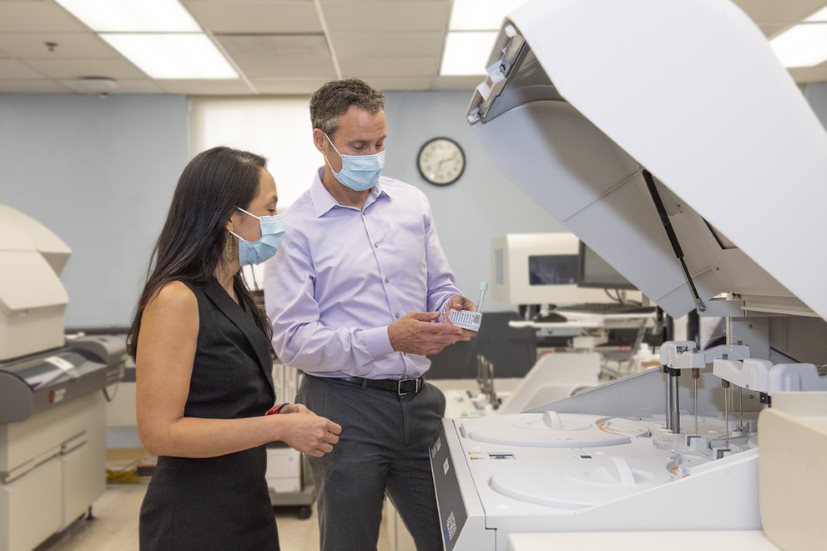More than 15 years ago, Dr. Michael Shlipak began studying a test he believed to be much more accurate in detecting kidney disease than the one in standard practice for decades.
Shlipak, then the chief of general internal medicine at the San Francisco VA Health Care System, compared the relatively unknown cystatin C test, which Swedish scientists created in 1985, to the long-used creatinine test. Cystatin C is a protein that lives in all cells in the body; creatinine is a chemical byproduct of muscle activity. Both are filtered through the kidneys and are measured via a blood test, so the blood level reflects the speed of the filtering. Low filtration rates indicate a kidney problem.
His first big paper on cystatin C appeared in the New England Journal of Medicine in 2005. Shlipak and his team found that elevated blood levels of cystatin C accurately predict higher risks of heart disease, stroke, and death among elderly people with no known kidney problems. The creatinine test misses those risks almost entirely, according to the researchers.
`That study put cystatin C on the map’
Fast forward to today, and the creatinine test is still the predominant choice among nephrologists, who treat kidney disease. The question is why.
“That study put cystatin C on the map as saying, `Wait a minute. This may be a marker that could be useful,’ Shlipak says. “Cystatin C is clearly superior to creatinine because it overcomes the major weakness of creatinine’s inaccuracy in people with reduced muscle or limited activity. The obvious mystery is why after 15 years we’re still not using it very much. I can’t explain why the medical field is content to continue using creatinine when we have a better alternative. Unfortunately, some areas of medicine, like kidney testing, are very slow-moving.”
VA officials `enthusiastic’ about test
But Shlipak is trying to pick up the pace. He is teaming up with the chief of nephrology at the San Francisco VA, Dr. Michelle Estrella, to improve kidney care for Veterans, in part, by making the cystatin C test available across the VA system. The two are co-leading a VA-funded study that will implement the test at the VA hospitals in San Diego and Houston, before it is accepted nationwide. They have also spoken to VA decision-makers about the test, including Dr. Michael Icardi, VA’s national director of pathology and laboratory medicine services, and Dr. Susan Crowley, VA’s national program director for kidney disease and analysis.
Icardi is “very enthusiastic” about incorporating the cystatin C test in VA. The procedure, he notes, does not have the limitations that come with the creatinine test, which is much less expensive per examination. But “with the advent of new measurement techniques, the financial advantage to creatinine testing is diminished,” he adds.
Crowley wants the cystatin C test made available through each of VA’s 22 VISNs (Veteran Integrated Service Networks). “Working with the VHA National Kidney Program and the VHA Pathology and Laboratory Medicine Service, Dr. Shlipak has been championing greater adoption of cystatin C measurement by VA providers,” she says. “Leveraging VA data, he and others have also been studying the use of cystatin C as a risk prediction marker for death among Veterans.”
Many Veterans have chronic kidney disease
Kidneys perform life-sustaining functions that keep the rest of the body in balance, including by removing waste products and excess fluids. They also maintain a safe level of blood chemicals and control blood pressure. But a gradual loss of their ability to filter blood properly can lead to kidney disease, which can progress to kidney failure. The latter requires a kidney transplant or dialysis, which rids the body of waste products and excess fluids.
Nearly 40 million U.S. adults, including many Veterans, are estimated to have chronic kidney disease, a huge risk factor for heart failure, heart attacks, and strokes. Kidney disease is the ninth-leading cause of death in the United States.
More Information
Click here to read the full story.
Click here to learn more about VA research.
Topics in this story
More Stories
In a new series that highlights advancements in VA health care, VA researchers and clinicians are appearing on a Veteran-themed media platform—Wreaths Across America Radio—to tout their critical work.
Recently published findings from the VA Disrupted Care National Project [...]
Diverse representation of women in health care research allows MVP to make discoveries for women’s health





